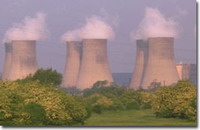Head of United Nations' nuclear watchdog agency visits India to take part in energy conference
United Nations' nuclear watchdog agency head arrives in India amid a heated political feud over the future of India's landmark civilian nuclear cooperation deal with the United States.

The visit by International Atomic Energy Agency chief Mohamed ElBaradei, who arrived in Mumbai late Monday, is long-planned, and officials say it is routine. He's scheduled to speak at an energy conference, tour a nuclear medicine research facility and meet with Indian nuclear officials during his five days in India.
But the timing of the trip is potentially explosive, with India's governing Congress party, the driving force behind the nuclear deal, engaged in a war of words with its communist political allies over the pact. The verbal sparring between the two sides has led to open speculation about the possibility of the government falling and early elections being held.
The deal reverses three decades of American anti-proliferation policy by allowing the U.S. to send nuclear fuel and technology to India, which has refused to sign international nonproliferation accords and tested nuclear weapons.
Hailed by Indian and American leaders as the foundation of a budding strategic partnership, the deal would also open up international nuclear markets to India and allow the energy-starved South Asian country to expand its nuclear power program.
But American critics say by providing fuel to India, the U.S. would free up India's limited domestic supplies of nuclear material for use in atomic weapons. That, they argue, could spark a nuclear arms race in Asia.
Opponents in India, led by the powerful communist political parties, say the pact would undermine New Delhi's nuclear weapons program and allow the U.S. to dictate Indian foreign policy.
That opposition has kept Indian officials from going to the IAEA to work out a deal on international inspections of India's civilian reactors, a major step in finalizing deal.
The communists, who are key to the Congress party's parliamentary majority, have threatened to pull their support for the government if New Delhi opens discussions with the IAEA, and officials insisted Monday that no such talk were planned during ElBaradei's visit.
"There are no talks or discussion planned on safeguards," said Department of Atomic Energy spokesman, S. K. Malhotra.
But many here nonetheless saw the visit as a sign that the government is determined to push ahead with the deal, even if it did not hold formal talks with ElBaradei in New Delhi.
Such speculation was fueled on Sunday when the leader of the Congress party, Sonia Gandhi, said in a speech that those who oppose the deal were "enemies" of India's progress - a clear jab at the communists.
On Monday, Indian stock markets dipped sharply on fears of early polls.
Subscribe to Pravda.Ru Telegram channel, Facebook, RSS!


